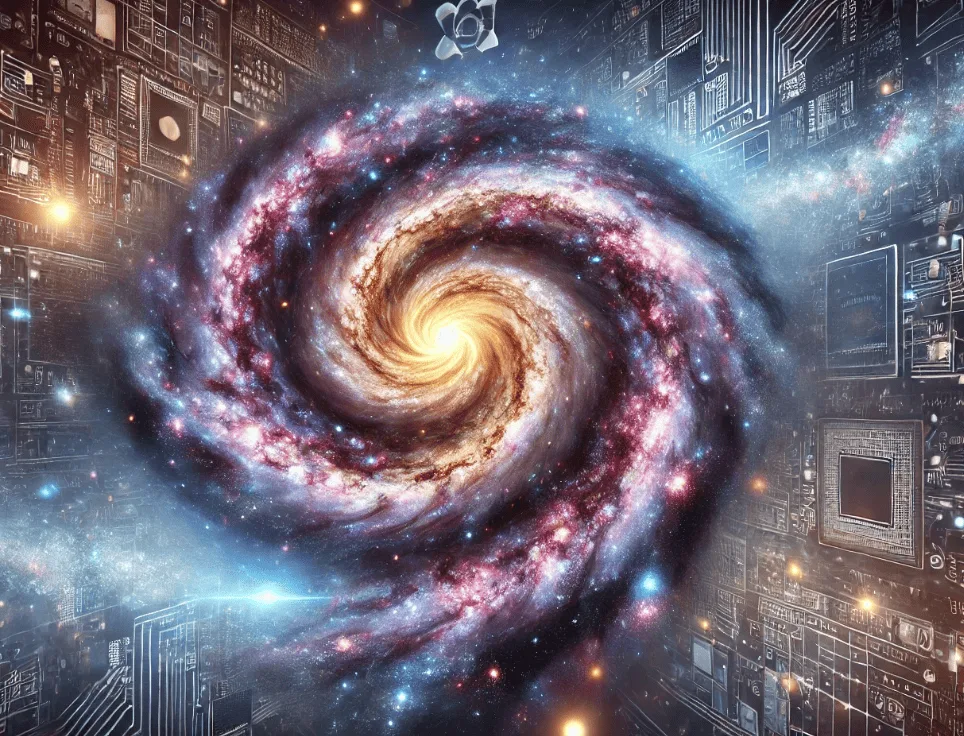The intriguing concept that the universe is a giant computer has captivated scientists and thinkers for decades. Now, a recent study strengthens this theory by highlighting the role of gravity in possibly supporting a computational model of the universe. This bold claim is not just a flight of science fiction but is gaining traction in theoretical physics and cosmology, where gravity—long understood as a fundamental force—might actually behave like lines of code in a grand universal algorithm.
In the first 10% of this article, we introduce the groundbreaking idea that the universe is a giant computer, and how gravity could be the key to decoding its computational nature. This concept touches on deep philosophical and scientific questions about our existence and the nature of reality.
The Simulation Hypothesis and Computational Universe
The idea that the universe could function like a computer is closely related to the simulation hypothesis, which proposes that all of existence might be part of an advanced digital simulation. The computational universe theory, however, takes a different approach. Rather than suggesting an external being or civilization created the simulation, this theory argues that the universe inherently operates like a computational system, with laws of physics acting as code.
How Gravity Fits In
Gravity has traditionally been seen as a curvature of spacetime, following Einstein’s theory of general relativity. However, in this new study, researchers propose that gravity could actually emerge from the information processing taking place at a fundamental level of reality. This shifts the perception of gravity from a force to a byproduct of computational interactions.
According to the study, space, time, and gravity may be emergent phenomena that arise from deeper quantum processes—possibly ones that resemble logic gates and algorithms running on a cosmic scale. If this hypothesis holds, gravity isn’t a force in the classical sense but rather an informational output.
Quantum Information and Gravity’s Role
Quantum mechanics has long been at odds with general relativity, but quantum information theory might provide the bridge. Researchers believe that spacetime and gravity could emerge from quantum entanglement patterns, which are mathematical structures not unlike binary code.
This study adds weight to the concept that the universe processes information in the same way a quantum computer might. The implication? Every particle, force, and interaction could be part of a universal computation, with gravity serving as a fundamental clue to that process.
Implications for Physics and Philosophy
If gravity supports the idea that the universe is a giant computer, this would represent a major paradigm shift in science. It would force us to rethink the building blocks of reality—not just as physical substances, but as data-driven entities.
From a philosophical standpoint, the theory raises questions about determinism, free will, and consciousness. Are human thoughts and emotions merely complex outputs of a grand calculation? Is the concept of randomness just a result of limited processing power or incomplete knowledge of the code?
Challenges and Criticisms
While the idea is intellectually stimulating, it also faces skepticism. Critics argue that likening the universe to a computer could be an anthropocentric projection—using human technologies as metaphors for natural phenomena. Moreover, there is no definitive empirical test yet to prove that the universe operates like a machine.
Nevertheless, the recent study provides new mathematical frameworks and models that could pave the way for future research. By focusing on gravity and its informational qualities, scientists hope to uncover more clues about the underlying structure of reality.
The Future of Universal Computation Theory
If the theory continues to gain traction, it could reshape the future of science and technology. For example, understanding how the universe computes could lead to revolutionary breakthroughs in quantum computing, AI, and even space travel.
Moreover, scientists might eventually develop tools to “read” or “hack” into this cosmic code, potentially allowing for unprecedented control over physical laws. This would not only transform our technological capabilities but also force a re-evaluation of humanity’s place in the cosmos.
Conclusion
The theory that the universe is a giant computer, supported by the role of gravity, is no longer confined to the realm of science fiction. With quantum information and emergent gravity now central to theoretical physics, this concept might be the key to unlocking the most profound mysteries of existence. While we are still far from definitive proof, this study marks an important step toward a new understanding of reality—one where physics, computation, and consciousness may be deeply intertwined.
